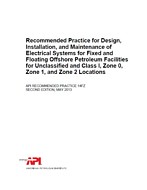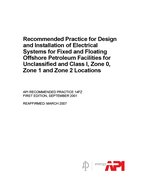
API RP 14FZ (R2020)
Original price was: $303.00.$182.00Current price is: $182.00.
Design and Installation of Electrical Systems for Fixed and Floating Offshore Petroleum Facilities for Unclassified and Class I, Zone 0, Zone 1 and Zone 2 Locations, Second Edition
| Published by | Publication Date | Number of Pages |
| API | 05/01/2013 | 188 |
API RP 14FZ (R2020) – Design and Installation of Electrical Systems for Fixed and Floating Offshore Petroleum Facilities for Unclassified and Class I, Zone 0, Zone 1 and Zone 2 Locations, Second Edition
This document recommends minimum requirements and guidelines for the design, installation, and maintenance of electrical systems on fixed and floating petroleum facilities located offshore. For facilities classified as Division 1 or Division 2, reference API 14F. These facilities include drilling, producing and pipeline transportation facilities associated with oil and gas exploration and production. This recommended practice (RP) is not applicable to Mobile Offshore Drilling Units (MODUs) without production facilities. This document is intended to bring together in one place a brief description of basic desirable electrical practices for offshore electrical systems. The recommended practices contained herein recognize that special electrical considerations exist for offshore petroleum facilities. These include:
a)inherent electrical shock possibility presented by the marine environment and steel decks;
b)space limitations that require that equipment be installed in or near hazardous (classified) locations;
c)corrosive marine environment;
d)motion and buoyancy concerns associated with floating facilities.
This RP applies to both permanent and temporary electrical installations. The guidelines presented herein should provide a high level of electrical safety when used in conjunction with well-defined area classifications. This RP emphasizes safe practices for hazardous (classified) locations on offshore petroleum facilities but does not include guidelines for classification of areas; for guidance on the classification of areas refer to API 505.
Advantages of area classification using zones are as follows.
–Often, particularly for new installations and for installations that are subject to upgrade or revision, it is advantageous to classify locations as “Zones” in accordance with Article 505 of the NEC versus “Divisions” as per Article 500. These advantages may include reduced initial capital expenditures, enhanced safety, or facilities that are more easily and more economically maintained.
–In the Zone classification system, locations classified as Division 1 in the Division classification system can now be classified and further divided into Zone 0 and Zone 1 locations. Electrical equipment suitable for Zone 1 locations is not required to be suitable for locations where flammable gases and vapors may be present continuously or for long periods of time, i.e. Zone 0 locations. Thus, the protection techniques for equipment to be installed in Zone 1 locations can be less demanding than the protection techniques for equipment to be installed in Division 1 locations. This may result in more cost effective installations or equipment that is more easily maintained.
Electrical systems for offshore petroleum facilities shall be designed and installed in accordance with the National Electrical Code, 2011 edition, except where specific departures are noted.
Product Details
- Edition:
- 2nd
- Published:
- 05/01/2013
- Number of Pages:
- 188
- File Size:
- 1 file , 5 MB
- Redline File Size:
- 2 files , 14 MB
- Product Code(s):
- G14FZ02, G14FZ02, G14FZ02
- Note:
- This product is unavailable in Russia, Cuba, Syria, North Korea, Ukraine, Belarus, Iran




